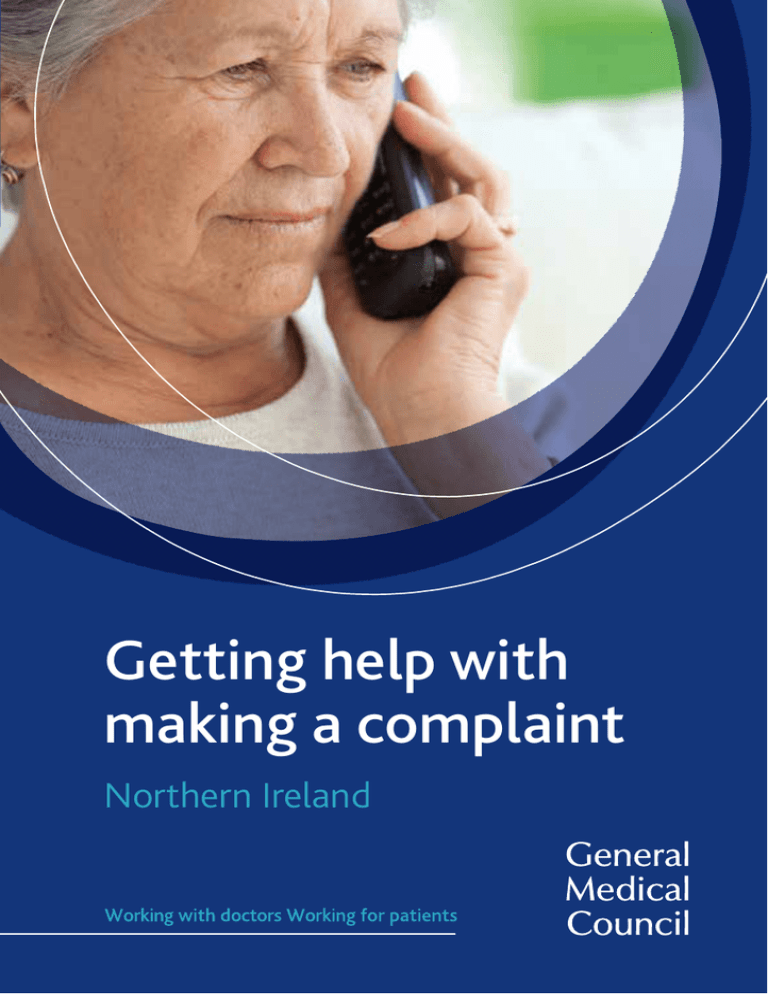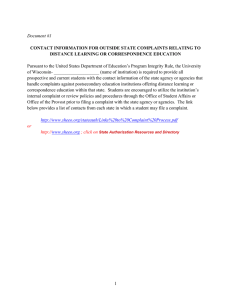Getting help with making a complaint - Northern Ireland
advertisement

Getting help with making a complaint Northern Ireland General Medical Council | 02 All patients should receive the best care possible. When you feel this has not happened, it can be confusing to know who to talk to about your experience and get the support you need. If we are investigating your complaint, this booklet sets out some organisations that can support you during the process, such as finding an advocate. If we can’t take your complaint forward, this booklet gives contact details of organisations that can help you decide what to do next. Most complaints can be settled more quickly by the organisation where you were treated or seen. If you haven’t already, we also explain how to raise the matter locally. 03 | General Medical Council Organisations offering support or advice when making a complaint or accessing health services Finding help with making a complaint Patient and Client Council 0800 917 0222 Provides confidential advice, information and help to make a complaint or find specialist advocacy services. It was set up as an independent voice on health and social care issues and represents the interests of the public by engaging with health and social care organisations.www.patientclientcouncil.hscni.net Action against Medical Accidents (AvMA) 0845 123 2352 Provides free specialist medico-legal advice and support with making complaints where there are concerns about patient safety, as well as support with inquests and other legal processes.www.avma.org.uk General advice Citizens Advice Bureau Northern Ireland 028 9023 6522 Provides confidential and independent advice to the public on how to resolve a range of issues. You can find details of your local bureau on their website. www.citizensadvice.co.uk Advice NI 028 9064 5919 The service lets you find details of organisations in your area that give advice on a range of issues and works to develop an independent advice sector in Northern Ireland. www.adviceni.net Emotional support Samaritans 0845 790 9090 Provides 24-hour confidential support services.www.samaritans.org General Medical Council | 01 Support with mental health or learning disabilities There may be times when you – or the person you are making a complaint on behalf of – have received an assessment or treatment for mental health. You can speak to someone at the health and social care trust about getting an advocate to help you understand your rights, or apply to the Mental Health ReviewTribunal for Northern Ireland to review the decision to use mental health powers. Northern Ireland Association for Mental Health 028 9032 8474 Provides independent professional advocacy and support for mental health service users across locations in Northern Ireland.www.niamhwellbeing.org Regulation and Quality Improvement Authority 028 9051 7500 Monitors the use of mental health law and can give information on your rights. It reviews the care and treatment of people using mental health services, including visiting patients who have been detained in mental health or learning disability hospitals. www.rqia.org.uk Mencap NI Learning Disability Helpline 0808 808 1111 Provides impartial advice to people a learning disability. www.mencap.org.uk/northern-ireland 02 | General Medical Council Making a complaint locally For patients of health and social care services Anyone who uses health and social care services has a right to complain, which should be done as soon as possible after becoming aware of your complaint. Most complaints can be settled locally, and more quickly, by the organisation where you received treatment. You can find more information about health and social care services on the NI Direct website at www.nidirect.gov.uk/health-services. For complaints about GP services, you should speak to the practice manager. You may prefer to talk to your local health and social care board about using the honest broker service, if you are uncomfortable speaking to the practice directly. For complaints about hospital, community, mental health, or out-of-hours services, you should speak to the complaints team at your local health and social care trust. You can find details of your local trust or board at www.nidirect.gov.uk. If you are uncomfortable speaking to someone at your local service, or need help at any point in the process, you can contact the Patient and Client Council who offer a complaints support service (see page 1 for details). Seeking a review of a local decision If you are unhappy with the response from your local service, you can contact the Northern Ireland Ombudsman to seek a review of the decision. Go to www.ni-ombudsman.org.uk or call 0800 34 34 24. General Medical Council | 03 For patients treated privately When you receive treatment from a private healthcare provider, you should raise your complaint with the manager at the clinic or hospital where you were treated. If your treatment is funded by the local health and social care trust, you should follow the process described previously. Many private healthcare providers have signed up to a code of practice, which includes an independent adjudication of complaints. If you are unhappy with the response from one of these providers, you can refer your complaint to the Independent Sector Complaints Adjudication Service. Go to www.iscas.org.uk or call 020 3713 1746. Health and social care regulation The Regulation and Quality Improvement Authority (RQIA) is Northern Ireland’s independent health and social care regulator. It encourages continuous improvement in the quality of health and social care services through a programme of inspections and reviews. You can access all RQIA inspection and review reports, and information about its work, at its website. If you wish to discuss a particular health and social care service, you can contact them at www.rqia.org.uk or on 028 9051 7500. 04 | General Medical Council General Medical Council | 05 Email: gmc@gmc-uk.org Website: www.gmc-uk.org Telephone: 0161 923 6602 General Medical Council, 3 Hardman Street, Manchester M3 3AW Textphone: please dial the prefix 18001 then 0161 923 6602 to use the Text Relay service This information can be made available in alternative formats or languages. To request an alternative format, please call us on 0161 923 6602 or email us at publications@gmc-uk.org. Published September 2014 © 2014 General Medical Council The text of this document may be reproduced free of charge in any format or medium providing it is reproduced accurately and not in a misleading context. The material must be acknowledged as GMC copyright and the document title specified. The GMC is a charity registered in England and Wales (1089278) and Scotland (SC037750) Code: GMC/CE-NI/0914 01 | General Medical Council
